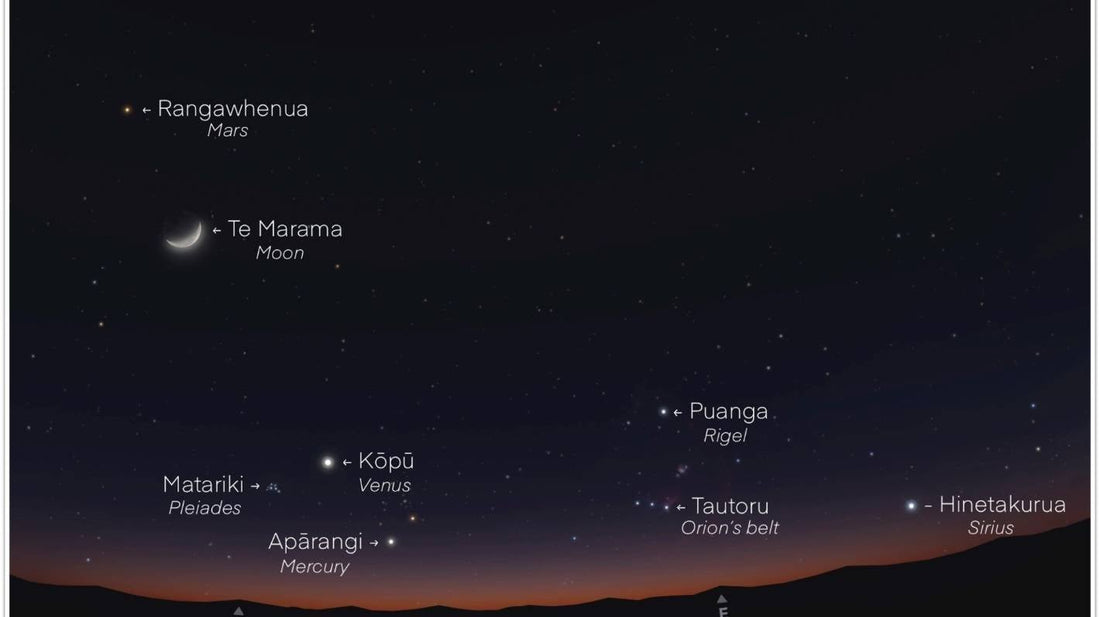Matariki is the Māori name for the group of stars also known as Pleiades or the Seven Sisters.
It marks the Māori New Year, and is a time for celebration, growth and renewal. It's a chance to get together and remember whānau who have died, share food, tell stories, sing and play music.
The two meanings of Matariki both refer to stars: mata ariki (eyes of god) and mata riki (little eyes).
Matariki is an abbreviation of ‘Ngā Mata o te Ariki Tāwhirimātea (‘The eyes of the god Tāwhirimātea’) According to Māori tradition, the god of the wind, Tāwhirimātea, was so angry when his siblings separated their parents, Ranginui the sky father and Papatūānuku the earth mother, that he tore out his eyes and threw them into the heavens.
The Matariki cluster rises mid-winter (June 24th 2022). Maori look to Matariki to predict if the next harvest would be abundant. The brighter and clearer the stars seems, the warmer the growing season would be – ensuring a good harvest.

The nine visible stars include: Matariki, Tupu-ā-rangi, Waipuna-ā-Rangi, Waitī, Waitā, Tupu-ā-nuku, Ururangi, Pōhutukawa and Hiwa-i-te-Rangi. Each star holds a certain significance over our wellbeing and environment, as seen from the Māori view of the world.
- Matariki is the star that signifies reflection, hope, our connection to the environment, and the gathering of people. Matariki is also connected to the health and wellbeing of people.
- Tupu-ā-rangi is associated with everything that grows up in the trees: fruits, berries, and birds. Tupu-ā-rangi loves to sing. Papatūānuku takes her to sing for te wao nui, for te wao nuite wao nui the great forests, and all the children of Tānemahuta. Her beautiful voice revives the forest and all the other creatures, including the manu (birds) and mokomoko (lizards). They share their waiata which fills the world with joy. We learn from her the importance of sharing our gifts with others, and appreciating those shared with us.
- Waipuna-ā-Rangi is associated with the rain. Waipunarangi accompanies her grandmother to the waters – the oceans, lakes and rivers – where she prepares the children of Tangaroa to feed the people. Papatūānuku also teaches her about how the water that spills down from Ranginui collects together to provide drinking water for the people, animal and plants. She also watches how the water is evaporated by the heat of Tama-nui-te-rā (the sun) int othe clouds that cloak Ranginui so that it may rain once more. Waipuna-ā-Rangi knows that if you give to others, all that kindness will come right back to you, and it is this lesson she shares.
- Waitī is associated with all fresh water bodies and the food sources that are sustained by those waters.
- Waitā is associated with the ocean and the food sources within it.
Waitī and Waitā are Matariki’s twins. Papatūānuku knew that they would be able to care for the smallest and fastest of creatures – because they too know about being a team. When insects work together, they can they can do amazing things. Ngā pī (bees), for example, pollinate all the flowers so that the plants grow, and we have air to breathe. Ngā pōpokoriki (ants) build huge, complicated tunnel cities underneath the ground, and carry many times their body weight. When we see these two stars in the sky, we are encouraged to join in and support each other.
- Tupu-ā-nuku is the star associated with everything that grows within the soil to be harvested or gathered for food. Tupu-ā-nuku is the eldest of Matariki’s daughters. She spends her time with Papatūānuku tending to plants. She pays special attention to making sure they have everything they need to grow big and strong so they can produce kai (food), rongoā (medicine) and kākahu (clothes). When we see her shining we are reminded that we all have our own special time and place, and to spend time growing our pūkenga (skills) as well as that of our friends
- Ururangi is the star associated with the winds. Ururangi enjoys racing all of her sisters to get to her kuia first. She claims the best spot on her grandmother’s lap and wraps herself in her arms, settling in for her favourite stories. Her tenacity and excitement, along with the awhi(hug) and her aroha (love) helps Papatūānuku to get into the righ mood after the cold and darkness of takurua (winter). Ururangi reminds us that a good attitude is always key to success.
- Pōhutukawa is the star associated with those that have passed on.
- Hiwa-i-te-rangi is the star associated with granting our wishes, and realising our aspirations for the coming year

